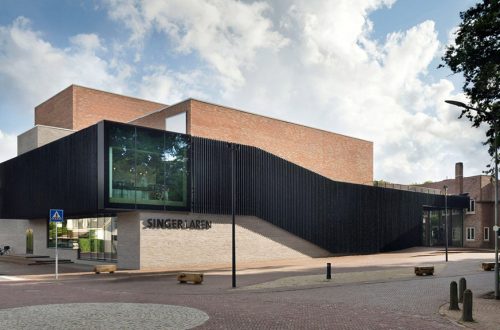
Helping children with Surprise reading service (Gouda, the Netherlands)
When the Public Library in Gouda was closed during the lockdown, they wanted to keep children reading so they wouldn’t fall behind with school. Therefore, the library called the Surprise reading service to life. It set an example of an organization where the employees were knowledgeable, involved, moved quickly, and came up with a very personalized solution. Together with their network they made sure the service was online and advertised in no time. In the end 600 bright orange bags with 4000 personalized books were being prepared for the kids of Gouda. The library will expand the surprise reading service to adults if they need to close down again.
Background
The history of the library goes back almost a hundred years. In the beginning, it was just a reading room. It was a place where you could sit quietly and read a book. In 1973 they moved to the orphanage in Gouda (Bibliotheek Gouda sd). This was a very cozy building with lots of stairs and niches. Still, the only thing you came for was books. In 2014 the library moved to the old chocolate factory in Gouda. (Bibliotheekblad 2013). After moving, the role of the library changed. In the old factory the regional archive, a printing workshop, restaurant, and an ICT specialist settled in as well. The chocolate factory became a hotspot in Gouda. Now it was a place for many things. Of course, you could still borrow books, but now you’d enjoy a cup of coffee or follow a free course to develop yourself. The free courses differ in aspects. They offer courses for adults, children, and the elderly. Through offering these courses they are active in the societal aspect, but the social aspect as well. Nowadays, they provide help for people who don’t have Dutch as their native language or need help with online tasks.
The mission of the library is to encourage reading pleasure and self-development. The library wants to be an inspiring place for everyone, from 0 to 100 years. Besides the activities for adults, they also organize activities for children. For example, the ‘Children’s book week’ is a national initiative. During this week, schools, libraries, and bookshops work together to stimulate reading for children. It’s important to the library that children keep reading, otherwise, they could fall behind. So, when the schools were closed during the lockdown they came up with a solution to ensure this would not happen. They invented the so-called: ‘Surprise reading service’ for children.
Description
The library noticed adults would still find their way to them, this was different for the children. Normally, their parents would bring them along and they would stroll around the library and leaf through different booklets. Once the library was closed due to the lockdown, they wouldn’t have that opportunity. Thus, one of the employees came up with the Surprise reading service. Usually, new projects take a lot of time. It involves many meetings and planning. However, with this project time was not wasted, due to the strong urge. The library created a form where parents could fill in the age, the reading level, and what kind of genre the child preferred. This form was available on the website on which they had added an extra web page. Here the user could find all the information about the service. Once the form was filled out, the website sent the form to the general email of the front desk. Because of this direct mailing the applications were processed immediately. Everyone from the staff had access to it. Once the e-mail was opened the expert librarians were on the move. These were employees with book expertise for all ages, levels and genres, would search for the perfect matches with the genres, age, and level stated on the forms. This made the selection of books for every child, not only a surprise, but very a personalized one. Thereafter, the books were scanned on the correct client account and via this way the user received an invitation to pick up the books. The books were put in a bright orange bag and presented as a little gift, making it extra exiting for the child to receive it.
Impact
The library informed the target group on the new project in different ways. They used their own social media accounts, and they used their network as well. On their social media accounts, also their network partners uploaded an advertisement to reach the people who are already familiar with the library. Next to their regular target group, they reached a larger audience through a collaboration with an intermediate for schools in the near surroundings and other local organizations. This collaboration was not new, they had worked together before. These organizations would write about the service in their newsletter or on their website.
When the library opened again, they have sent a survey to the participants. The overall response was positive. The main goal was that the children would keep on reading during the lockdown. In the Netherlands, when the school were closed there was a great concern about children falling behind at school, especially with reading and writing, a low threshold initiative like this has helped children keep in contact with books they enjoy. With 600 packages containing 4000 books in total, the service resonated with the target group. During the lock-down many parents were at home with their children, and this made it possible for them to keep on reading with their kids when nothing else was possible.
When asked if they want to continue this in the near future Miranda says: ‘that’s still up for debate. We loved doing it, but we prefer for everyone to come to the library. In that way, they can see the books and ask us questions or a book tip.’ However, if the library should close its doors again they will continue with this service and expand it for the adults as well.
Interpretation
The secret to the initiative’s success was to have a very clear and specific aim and target group in mind, which they combined with expertise on the subject. The concept had an element of surprise, creating a positive effect on the children involved. Thanks to a network already in place, its small scale and low tech nature, it was a quick and easy to create initiative. The library’s advice for all other organizations dealing with restrictions, is to just try out new ideas, and not to think too long about what could go wrong, and to have a clear view on the target group and the issue to be resolved.
References
- Bibliotheek Gouda. Geschiedenis. sd. https://www.bibliotheekgouda.nl/overons/Geschiedenis.html (Accessed 14 January, 2022).
- —. Organisatie. sd. https://www.bibliotheekgouda.nl/overons/organisatie.html (Accessed 14 January, 2022).
- Bibliotheekblad. Nieuws. 15 11 2013. http://oud.bibliotheekblad.nl/nieuws/nieuwsarchief/bericht/1000004749 (Accessed 14 January , 2022).
- Elswijk, van Miranda, interview by Simone da Graca. Interview Bibliotheek Gouda (11 January 2022)
Author
- Simone da Graça, student at Inholland University of Applied Sciences
Header photograph
Freepik Company, S.L on Wikimedia Commons




